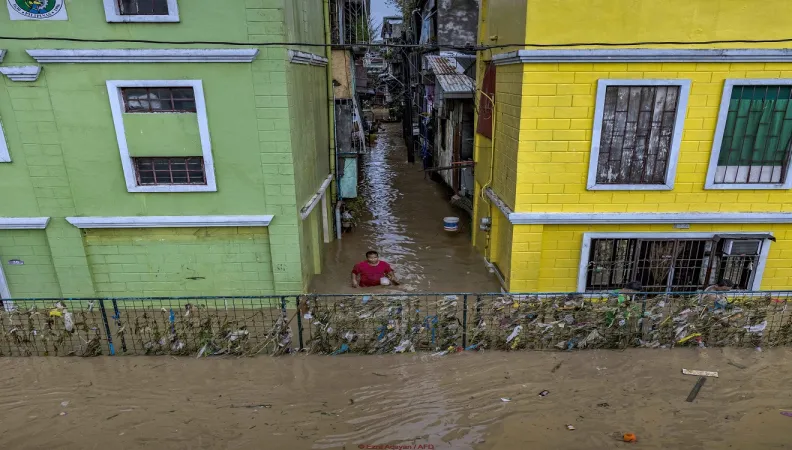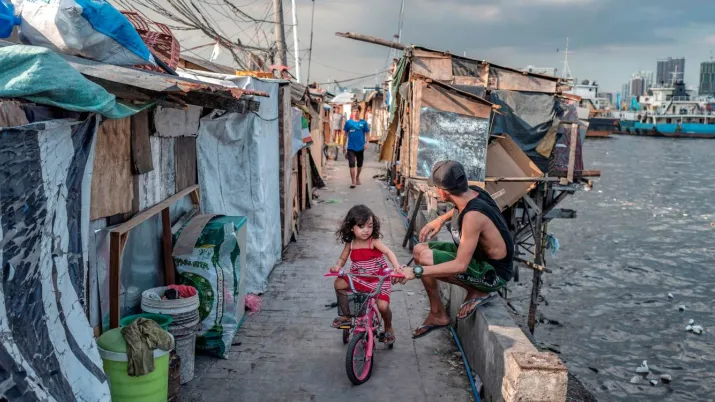Share the page
Improving Preparedness for “Natural” Disasters
Published on

To limit the impact of extreme weather events, careful planning and preparation are essential. To mark the International Day for Disaster Reduction on October 13, two AFD Group experts discuss the need for well thought-out prevention and preparation strategies.
After the deadly floods in Libya, which left more than 10,000 people still missing, megafires in the Mediterranean, Canada and New Zealand, earthquakes in Morocco, Syria and Turkey, and super typhoons in the Pacific, 2023 has been a year of natural disasters. These events resulted in economic losses of $194 billion in the first half of the year, significantly higher than the figure of $128 billion for the average year throughout the 21st century.
However, the widely used term “natural disaster” to describe extreme weather events is being increasingly contested. “We shouldn’t use the term natural disaster, because the catastrophic toll is predominantly caused by human activity,” says Guillaume Bouveyron, expert in disaster risk reduction at AFD. “Such disasters mainly result from failures in prevention and preparation, substandard infrastructure and the lack of risk preparedness, warning systems, or the political will to increase the resilience of countries.”
Preparedness and prevention strategies for more resilient societies
Even if global temperatures do not increase by more than 1.5°C, due to climate change, extreme weather events will continue to become more frequent and severe, and have an increasingly greater impact on systems and societies.
Investing in risk prevention and preparedness strategies is now an essential prerequisite for building a more resilient world: “Prevention and preparedness are the two key pillars of disaster risk reduction,” says Pauline Georges, Disaster Risk Reduction Project Manager for Expertise France. “They must be accompanied by a post-disaster emergency response phase, followed by a recovery/reconstruction phase.”
Expertise France: Strengthening Civil Protection and Relief Capacities in Jordan
The Adapt Now Report, published by the Global Commission on Adaptation, found that just 24 hours warning of a coming storm or heatwave can cut the ensuing damage by 30%. And yet, one in three people worldwide is still not covered by early warning services.
“The population itself can play an active part in its own resilience,” says Pauline Georges. “In the event of a cyclone for instance, if the population has been trained to identify and understand the risks (so that they can read alert levels, comply with safety instructions issued by the authorities and be aware of evacuation plans, etc.), they will know what behavior to adopt to ensure their own safety. This helps limit the number of high-risk situations and reduces pressure on the emergency services.”
Risk reduction for development
“Natural” disasters have a significant impact on developing countries, due to issues such as poverty, rapid and informal urban development, social inequalities, a lack of governance and ongoing conflicts. The economic losses resulting from such disasters are 20 times greater in developing countries than in the Global North (in terms of GDP percentage).”
According to AFD Group, prevention and preparedness strategies for disasters must be integrated into all adaptation and development policies to build more resilient and fairer societies. Consequently, the Group has developed a range of financial instruments (loans and grants) and technical support mechanisms in this field. In the Philippines, Mauritius and Madagascar, AFD is supporting structural reform by granting public policy loans for disaster risk reduction policies.
Since 2019, AFD has also been financing contingency loans granted on the condition that a state of emergency has been declared in the wake of a “natural” disaster. This financial instrument can be used to support structuring institutional reforms in risk management and to meet governments’ immediate needs through an injection of liquidity.
Further reading: Adapt'Action, improving climate change adaptation
Projects with local NGOs
In collaboration with NGOs, AFD also supports local projects to strengthen the resilience of institutional players and populations vulnerable to extreme weather events and disasters. In the Akkar and Bekaa regions of Lebanon for instance, where floods have been on the rise, AFD is working together with Lebanese institutional actors (DRM-U and CNRS-L) and a consortium of NGOs made up of Solidarité International, the French Red Cross and the Lebanese Red Cross. The aim is to reduce the risk of flooding by working with communities and facilitating the development of a pilot risk management system.
In Mozambique, a financing agreement has been signed between AFD, the Foundation for the Conservation of Biodiversity (Biofund) and WWF, with the aim of building local players’ capacity to deal with cyclones. As part of the project, mangrove forests in the Zambezi Delta will be restored. This nature-based solution provides a protective barrier against erosion, strong winds and cyclonic swells, demonstrating the synergies between protecting biodiversity and preventing natural disasters.
The project also involves raising awareness among members of target communities about the measures to take in the event of flooding, in conjunction with the French Red Cross and the national Mozambican Red Cross Society.
The Group is also supporting the Indian Ocean Regional Intervention Platform (PIROI), a regional support platform for intervention, preparedness and response, to deal with the impact of climate, natural and health disasters on populations, run by the French Red Cross with the Red Cross and Red Crescent network of Indian Ocean countries. This region is vulnerable to geological and climatological hazards and to the effects of climate change. Following phase 1 (2019-2021) and the ongoing phase 2 of the Three Oceans program, PIROI has doubled its storage capacity and is now equipped with a mobile hospital that can be transported across the region. In the near future, it will also feature a regional center for expertise, training and innovation.
Expertise France: working to strengthen resilience
As part of a disaster risk reduction program, Expertise France supports its partner countries by implementing projects aimed at reducing the impact of disasters and at strengthening the resilience of communities, systems and institutions. In Jordan, Expertise France has implemented a project with AFD financing to strengthen the operational resources and territorial coverage of the civil protection services provided by the Jordanian Civil Defense (JCD), which will benefit communities living mainly in the Mafraq Governorate.
This project was involved in creating the Civil Protection Office and the Risk Assessment Office, with a view to gaining more in-depth knowledge of risks through risk mapping and the drafting of contingency plans. This enhanced risk knowledge, combined with civil protection training, provides the basis for a comprehensive operational response by the emergency services.
Further reading
Laurent Klein: "Disaster Risks Preparedness and Management are Played out at the Local Government Level”
On the occasion of the launch of the first disaster preparedness and management tool for local government units (LGUs), Laurent Klein, Director of AFD's Manila agency, explains the challenges of local...
Published on February 24, 2020

